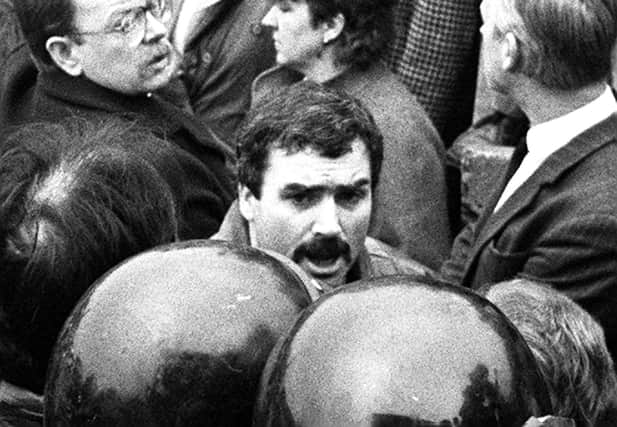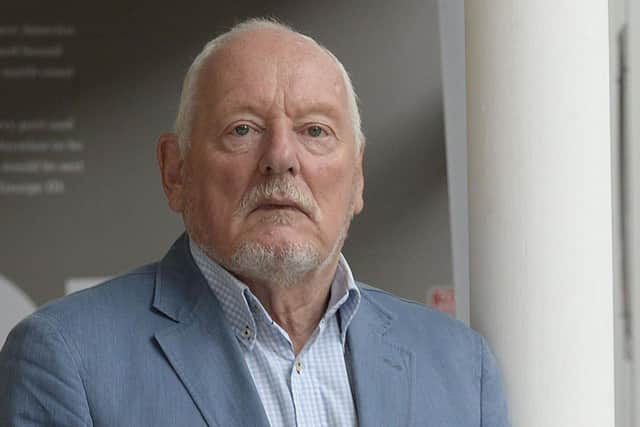Jeffrey Dudgeon: There are important questions to be asked of the PSNI chief Jon Boutcher about latest batch of Operation Kenova non-prosecutions


The files once again related to Freddie Scappaticci, the agent known as Stakeknife. A pattern is clear as this is the third decision by the Public Prosecution Service (PPS) not to prosecute in Kenova cases.
There are now important questions to be asked of Kenova and the former Officer Commanding, Jon Boutcher, on these non-prosecutions, about the legal advice provided before sending these files to prosecutors, and the vast cost of the investigations.
Advertisement
Hide AdAdvertisement
Hide AdProsecutions were ruled out for two army veterans for misconduct in public office and two IRA men for involvement in murder. The PPS’s cogent and well-argued justification was basically lack of usable evidence.


In December 2023, the previous PPS announcement in Kenova cases was a decision not to prosecute six army veterans and two police officers allegedly involved in a conspiracy to pervert the course of justice. This concerned the non-prosecution of a suspect for false imprisonment and arose from a referral by the Police Ombudsman (PONI).
Back in October 2020, the first PPS non-prosecution announcement concerned four Kenova cases: Freddie Scappaticci for perjury; a senior PPS staff member because of a failure to prosecute him for perjury; and two members of MI5, the last three for misconduct in public office.
These PPS decisions need analysed so that ungrounded assertions are tested. In the most recent, the main allegations against the two army Force Research Unit (FRU) agent handlers involving 10 incidents and four murders were that:
Advertisement
Hide AdAdvertisement
Hide AdIt would have been obvious to them that Freddie Scappaticci’s role involved him in criminal activities; and they failed to mitigate the obvious risks associated with this;
Their priority was Scappaticci’s welfare to the detriment of the safety of others; and they failed to take appropriate preventative action;
Scappaticci participated in activity beyond what was permitted in the relevant guidance on agent handling and the handlers failed to take appropriate action.
The PPS explained the test for a misconduct prosecution thus: “This offence is concerned with neglect to perform a duty, which is deliberate, as opposed to accidental, and which must be accompanied by an awareness of a duty to act or a subjective recklessness as to the existence of the duty. Where misconduct, as opposed to wilful neglect, is alleged, this refers to deliberate or reckless conduct which goes beyond mere neglect of duty and is often akin to corruption. The threshold for such an offence is a high one and a mistake, even a serious one, will not be sufficient to meet this threshold. It is necessary to show that the officer acted in a bad faith, for example by having no honest belief that they were acting lawfully.”
Advertisement
Hide AdAdvertisement
Hide AdIt is perfectly plain from the PPS statement that evidence of any such deliberate misconduct was just not there. In general, in all these cases, even a first year law student could have told you there was no prospect of a successful outcome.
The, perhaps unintentional, impression left by the PPS in its detailed explanation is that the security forces, the police and Scap himself made great efforts to initiate rescues for those captured by the IRA.
In one 1982 case, highlighted in the Irish News on February 8, where the victim was held in Co Monaghan, no record of contact with the Guards were found. He had however been moved to another address to be executed.
The latest PPS statement said decisions on the final six Kenova files are expected “at the end of February 2024”. It was also stated that since December, “We have received two further files from Operation Kenova”. They postdate Jon Boutcher’s departure from Kenova to become PSNI Chief Constable. It is concerning that two further prosecution files have been forwarded at this very late stage.
Advertisement
Hide AdAdvertisement
Hide AdThe PSNI will then issue Jon Boutcher’s 'high level interim' report on army, police, MI5 and IRA failings which will be damning in relation to the protection of informers. This has wisely been held back until the final PPS decisions, as the Malone House Group and others advised to avoid prejudging any prosecution. This was contrary to Mr Boutcher’s initial intention, so must have been decided by the senior PSNI officer now in charge, the chief constable having recused himself. The other big re-investigation into the so-called Glenanne Gang, Operation Barnard, will be subsumed into Sir Declan Morgan’s ICRIR in May along with all PSNI and PONI legacy inquiries.
There are important questions to be asked about these non-prosecutions.
The cost to date of the judicially required re-investigations undertaken by Kenova is approaching £50 million. Do judges take into consideration the huge expense in ordering such inquiries, given the minimal benefit in terms of information recovery and successful prosecutions? The Supreme Court is increasingly of the view that, despite Strasbourg, events before 1990 are too distant and witness evidence too shaky for useful re-investigation.
What was Jon Boutcher’s legal advice on outcomes before putting these files up to the PPS, ones that seemed only too likely to fail?
Advertisement
Hide AdAdvertisement
Hide AdThe PPS said there were up to 60,000 pages in some Kenova files which explains the long delays. Surely a police investigation distils the evidence to a manageable level to enable a prima facie prosecution decision? This would not happen in England where there is a much more immediate interconnection between the police and the CPS.
The Kenova stance, basically a CID one, is that no one is above the law and, if breached, then prosecution should follow. Fine if there is law to deal with armed conflict and the related legal and life threatening issues. But there was no clear law for handlers – as to what was acceptable when running agents in proscribed organisations. The Home Office guidance from 1969 was recognised as being unsuitable. Indeed the legal issues were not properly dealt with until the 2021 Covert Human Intelligence Sources (CHIS) (Criminal Conduct) Act. Ironically, with reliance on electronic surveillance such sources have become less important.
Intelligence documentation appears to have formed the majority of the material submitted to the PPS, in the hope it would be regarded as sufficient and admissible. This occurred previously with the Stevens inquiry and also with the Police Ombudsman when such reports were ascribed a level of reliability, far in excess of what was warranted, simply because they fitted the hypothesis being pursued.
In truth, information on the running of agents and their deaths can never be revealed to relatives’ satisfaction. ‘Neither Confirm Nor Deny’ is its very nature.
Advertisement
Hide AdAdvertisement
Hide AdThere are plainly two conflicting approaches to intelligence and statecraft. The pragmatic response to the unprecedented terrorist campaigns of the 1970s and 1980s which posed equally unprecedented threats to public safety, or the retrospective, if principled, approach involving endless, costly and fruitless re-investigations. The years of the latter are now over.
Jeffrey Dudgeon is Malone House Group Convenor, which challenges the anti security force imbalance in legacy investigations